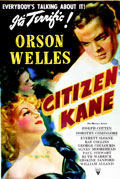
Directed by
Orson Welles
119 minutes
Rated PG
Reviewed by
Bernard Hemingway


Citizen Kane
That Orson Welles was only 25 years old when he made Citizen Kane, regularly touted as “the best film ever made” (a probably unprovable claim), is quite remarkable butperhaps not as remarkable as the fact that already for a decade he had been regarded as a wunderkind in the world of theatre, and particularly so after his infamous 1938 “War of the Worlds” radio broadcast.
Both mediums have a clear influence on this his debut film whilst Welles’s reputation garnered him some top drawer collaborator notably including cinematographer Gregg Toland who had just finished The Grapes Of Wrath (1940) for John Ford and who offered his services to the tyro director, A-list scriptwriter Herman J. Mankiewicz (who with Welles as co-author won an Oscar for the screenplay), Bernard Hermann who had worked with Welles on his radio productions and Robert Wise, assisted by an uncredited Mark Robson as editor, not to mention the little recognized contribution of Linwood Dunn and Vernon Walker on what was for its time state-of-the-art post-production work.
Whilst Toland in particular is vital to the film’s effectiveness this does not devalue the auteurial hand of Welles. It remains to this day a marvellous achievement, not least as a debut, and Welles never managed to top it (although legend has it that he would have the following year with The Magnificent Ambersons had not RKO irretrievably butchered the original print).
Although the uniqueness of the film, a thinly veiled account of the life of newspaper tycoon Randolph Hearst with Welles in the title role, was recognized at the time it was not a commercial success. The critics, and even Welles himself had reservations about the film’s “coldness” – it's lack of organic development or insight into the character of Kane as he evolves from passionate idealist to lonely recluse. Indeed we get very little indication of what happened to the enthusiastic young man who appears at the outset of the film and ineluctably declines into cynical loneliness..
But giving an account of such a man's life in two hours is perhaps an impossible project and whilst the episodic approach used here handles the evolution in rather lumpy, prosthetically-enhanced steps, this is not only not as much of a problem as it might seem (how much do we know of the inner life of Michael Corleone, for instance?), the final shot of the “No Trespassing” sign on the gate of Xanadu echoing the scripted conclusion voiced by the investigating journalist (William Alland) that Kane’s inner life will forever remains inaccessible, Of course, unlike the players, we the audience know the meaning of “Rosebud” and thus the loss that ultimately determined the tragedy that was Kane's life.
Want something different?





